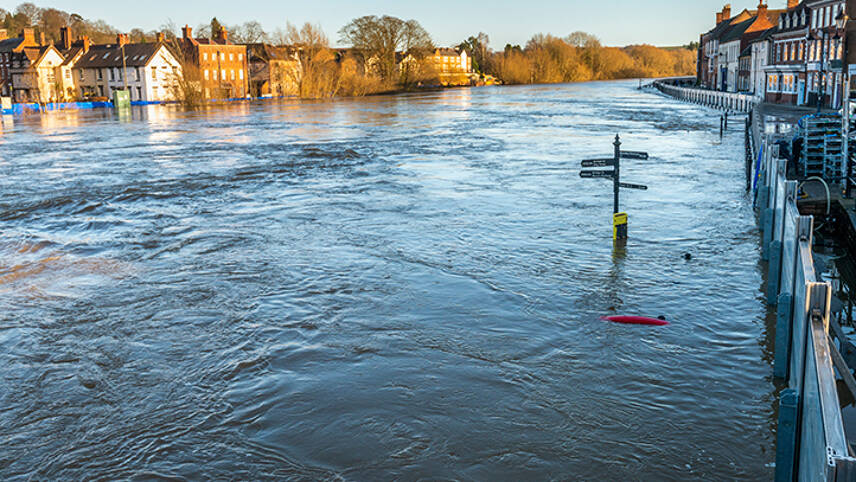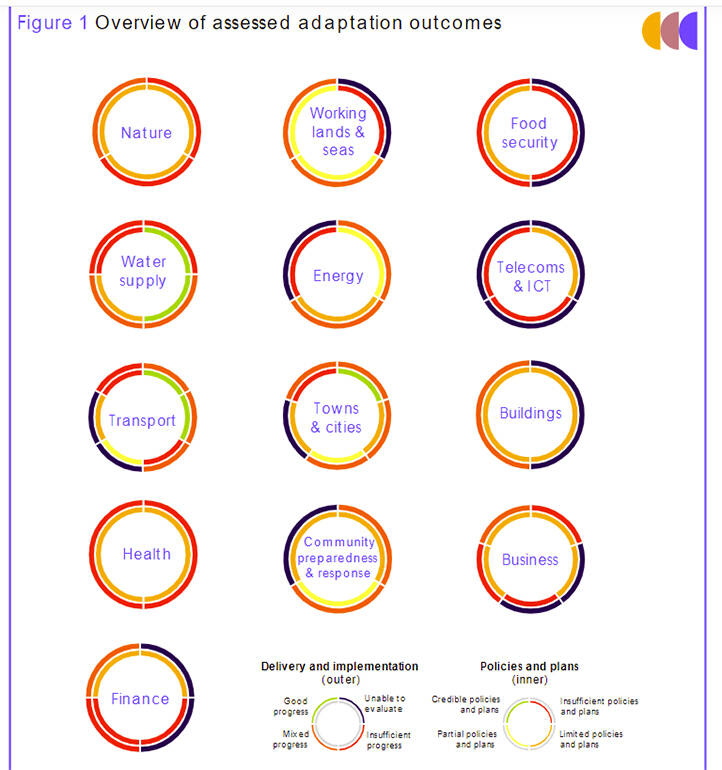Register for free and continue reading
Join our growing army of changemakers and get unlimited access to our premium content

The CCC is recommending that the Government delivers a complete overhaul of adaptation and how it is included in green policies
The CCC has today (29 March) its 2023 report to Parliament, analysing the Government’s response to the ongoing climate crisis and how more severe weather events will impact society and the economy.
The report is based on the Government’s own Climate Change Risk Assessment (CCRA3), published last year, which outlined more than 60 risks and opportunities facing the UK through the lens of the climate crisis. Risks and opportunities cover nature, infrastructure, economy and society.
The CCC, however, claims that the current National Adaptation Programme introduced by the Government is failing to match the scale of the challenge of the climate crisis. The Government is notably planning to publish its third iteration of the Programme this summer.
As such, the CCC is recommending that the Government delivers a complete overhaul of adaptation and how it is included in green policies. The report warns that of the 45 adaptation outcomes examined by the CCC, only five have the required policy milestones in place to deliver them. Additionally, none of the 45 adaptation outcomes have been able to showcase that they would appropriately reduce climate-related exposure and vulnerability. For 25% of the outcomes, available indicators from green policy show “insufficient evidence of progress”.
“The next National Adaptation Programme (NAP3) must be much more ambitious than its predecessors and lead to a long overdue shift in focus towards the delivery of effective adaptation,” the report states.
“It must permanently and fully embed adaptation across Government and within all relevant major policies and strategies. It must also put in place the enabling conditions needed to drive adaptation by businesses and financial institutions. If the next National Adaptation Programme falls short, it risks another lost five years of ineffectual adaptation action – which the UK’s people, ecosystems and infrastructure cannot afford.”
With the UK having experienced its first 40C day in the summer of 2022, the CCC warns that the UK is experiencing its clearest indications of tangible climate impacts, which will only worsen without adequate adaptation policies.
Broadly, the report warns that current green policies are not underpinned by targets of tangible deliveries and that adaptation is not a key policy across Government departments. The report also finds that poor financing and data collection and monitoring are barriers to action.
There are some notable recommendations the report makes ahead of the Government’s update this summer. The first is for a refresh of the Green Finance Strategy this year alongside the NAP, which would “clarify where the Government expects adaptation actions to be funded through public sources”.
A planning and policy reform would also be required to make climate resiliency a priority, including “mandatory adaptation interventions on all built environment project applications”.
The CCC also calls for a new designate to be introduced for bodies like Ofgem for the maintenance and security of the energy sector. Ministers are, notably, currently rowing about whether Ofgem’s climate mitigation remit should be aligned with the UK’s updated climate targets.
The report also features a segment on business preparation and risk on adaptation. The report notes that while many more businesses are now reporting climate risks, there is a gap” in the disclosure of physical risk management and adaptation action. Businesses are being hampered by a “lack of aligned and consistent adaptation standards” and “limited financial instruments to support business adaptation actions”, the report added.
Commenting, Baroness Brown, chair of the Adaptation Committee, said: “The Government’s lack of urgency on climate resilience is in sharp contrast to the recent experience of people in this country. People, nature and infrastructure face damaging impacts as climate change takes hold. These impacts will only intensify in the coming decades.
“This has been a lost decade in preparing for and adapting to the known risks that we face from climate change. Each month that passes without action locks in more damaging impacts and threatens the delivery of other key Government objectives, including Net Zero. We have laid out a clear path for Government to improve the country’s climate resilience. They must step up.”
Earlier this year, the CCC published a report claiming that at least half a billion pounds, and up to £1bn, will need to be funnelled into adaptation in the UK each year during the coming ten years. A far higher figure of £10bn is floated by the CCC itself.
In late 2022, the Joint Committee on the National Security Strategy accused the UK Government of a “severe dereliction of duty” due to a lack of responsibility for improving the climate resilience of critical infrastructure like power distribution networks, transport networks and communications infrastructure.
Industry reaction
Gareth Redmond-King, Head of International Programme at the Energy and Climate Intelligence Unit (ECIU)
“Half the UK’s food is imported, and half of that comes from climate change hotspots. Food supply is just one of the ways our national security is imperilled by an increasingly unstable world. Last year, gas prices and climate impacts added hundreds of pounds to British consumers’ food bills. This year, yields of some vegetable crops have fallen off the back of extreme heat and subsequent drought.
“In a report the UK signed up to, the IPCC warned just last week that we’re running out of time to get on track towards net zero mid-century. That’s the only way we stand a chance of avoiding even worse impacts – slashing our emissions, and adapting to the damage those emissions have already caused. At the end of the day, it is wiser and cheaper to put a fire out rather than just to let it burn.”
Caroline Lucas, Green Party MP for Brighton Pavilion
“As this damning report makes clear, in the race to adapt to the climate emergency, the Government has put us barely at the starting line. Yet for as long as Ministers continue to under-plan, under-deliver, under-resource and under-estimate the scale of the challenge, our country will remain woefully under-prepared.
“The CCC is clear that the current adaptation programme lacks ambition and fails to drive action across Government – leaving people, nature and communities ever more vulnerable to worsening climate impacts. In the past year, we’ve seen flooding, drought, chronic food shortages and the hottest temperatures on record – the climate emergency has well and truly arrived. Not only are we ill-equipped for what’s happening now, but we’re also nowhere near ready for what could happen in the future. The Government is still only meeting required policy milestones in one ninth of adaptation outcomes, and climate risk isn’t being managed appropriately in a single one of the 45 areas assessed.”
Rt Hon Philip Dunne MP, chair, Environmental Audit Committee:
“The CCC’s latest report paints an alarming picture. There are clearly significant holes in the policy response to the effects of climate change. We are seeing impacts now: the recent shortages of fruit and vegetables on supermarket shelves highlight the vulnerability of the food sector to climatic extremes. The reported increase in heat-related mortality during the record-breaking temperatures last summer demonstrates our need to adapt to the increasing frequency and intensity of heatwaves.
“The heat is on the Government to show grit and determination to address the negative impacts that the changing climate will continue to have on our daily lives. Time is running out to adapt the country to the hotter drier summers and wetter winters which will be a feature of our future climate. Ministers must rise to the challenge now rather than pushing adaptation issues further down the agenda.”
Chris Richards, director of policy at the Institution of Civil Engineers
“Today’s Climate Change Committee report is a stark warning to the UK Government that it needs to make climate adaptation and resilience a policy priority now, before any more time is wasted.
“The current approach is not working – there are significant data gaps and few fully credible plans across many systems. As the UK continues the transition to net zero, more and more of the country’s infrastructure systems will rely on electricity. Without understanding how these systems depend on one another, we risk a single point of failure that would impact communication, transport, and vital services like being able to heat homes, schools, and hospitals.
“To effectively plan, data gaps need to be closed so that action on the most vulnerable elements of the UK’s infrastructure is prioritised.”



Please login or Register to leave a comment.